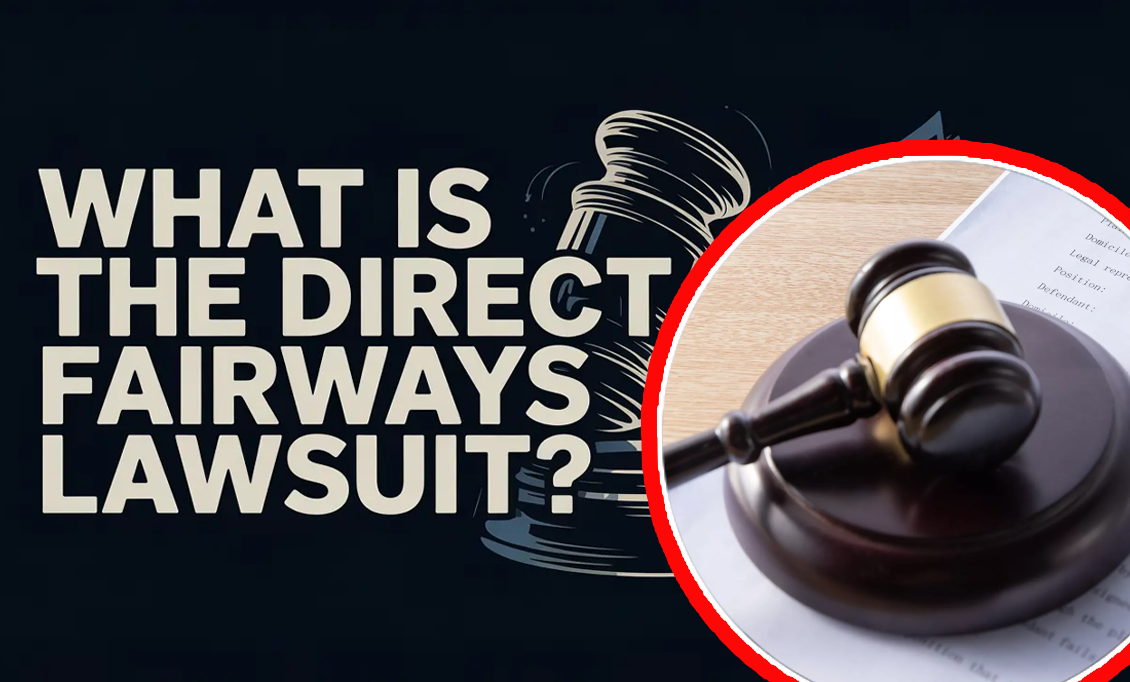The Direct Fairways lawsuit has become a point of interest for many small business owners and marketers. The controversy involves accusations against Direct Fairways, a marketing company known for its advertising services aimed at golf courses. Over time, various claims have emerged regarding deceptive business practices, and the legal actions taken in response have made headlines. This article will break down the key details of the lawsuit, the impact it has on small businesses, and what business owners can learn from this situation.
What is the Direct Fairways Lawsuit?
Direct Fairways LLC is a marketing company that specializes in placing advertisements on golf course materials, such as scorecards, tee signs, and yardage books. It targeted small businesses, offering them a unique way to advertise to golfers. However, over time, numerous complaints began to surface about how the company conducted its business.
The Direct Fairways lawsuit stems from these growing concerns. Business owners who had used Direct Fairways’ services started to report problems, including deceptive sales tactics, unauthorized charges, and failure to deliver the advertising services as promised. The company was accused of promising more prominent placements for advertisements and then failing to deliver on those promises. Additionally, many clients were charged for services they never received or were overcharged without proper consent.
Legal Aspects of the Direct Fairways Lawsuit
At the heart of the Direct Fairways lawsuit are several legal claims, including fraud, breach of contract, and violations of consumer protection laws. These accusations were brought forward by both customers and former employees who felt wronged by the company’s business practices.
One of the most significant complaints was about unauthorized charges. Customers alleged that Direct Fairways charged their accounts for advertising services that were either never provided or were different from what had been promised. Many also reported that they had difficulty reaching customer service, leading to frustration and even greater financial losses.
As the lawsuits progressed, the Arizona Attorney General and the Better Business Bureau got involved. These entities began investigating the company’s operations. In some cases, regulatory authorities found evidence of misleading business practices, and they began taking action to hold Direct Fairways accountable for its dealings.
Impact on Small Businesses
Small businesses are often the target market for companies like Direct Fairways, as they offer affordable and unique advertising opportunities. However, in this case, small businesses found themselves at a significant disadvantage. Many business owners relied on Direct Fairways to help them reach potential customers at local golf courses, an audience that could have brought in valuable leads. Instead, they found themselves in costly disputes and, in some cases, financial ruin.
The impact on these businesses was severe, with many reporting financial losses from services that were never rendered. In some instances, businesses were forced to spend additional funds on resolving the issues, including hiring legal representation or attempting to resolve disputes through regulatory bodies. Some were charged for months or even years for advertising that was never placed.
Business owners who got involved in the Direct Fairways lawsuit also learned the importance of transparency in contracts and agreements. Clear, well-defined terms are essential to ensure that both parties understand what is expected. Unfortunately, many clients claimed that the contracts they signed were vague and difficult to interpret, leading to confusion and disputes later on.
What Direct Fairways Says About the Lawsuit
Direct Fairways has not been entirely silent in response to the lawsuit. The company has denied many of the accusations made against it, stating that the issues reported by clients were isolated incidents. According to the company, it believes that any discrepancies in the services provided were due to misunderstandings or miscommunications between them and their clients.
Despite these denials, Direct Fairways has attempted to resolve the issues by offering refunds to customers who had paid for services that were not delivered. However, the company also faced criticism for the lack of timely resolution in many cases. Many business owners felt they were left to fend for themselves, with little recourse until they took legal action.
Key Takeaways for Advertisers
The Direct Fairways lawsuit provides valuable lessons for small business owners and advertisers. First and foremost, it highlights the importance of thorough vetting before entering into any advertising agreement. Business owners must ensure that the company they’re working with has a good track record and clear business practices. This includes reading through contracts carefully and asking questions about any vague or confusing terms.
Another key takeaway is the importance of maintaining clear communication with advertising partners. If something seems off or isn’t being delivered as promised, it’s essential to address the issue immediately. Businesses should have documentation of all transactions and communication to protect themselves in case of disputes.
Additionally, business owners should always be aware of their legal rights. If a situation escalates, it may be necessary to take legal action, as the customers involved in the Direct Fairways lawsuit did. Understanding the basics of consumer protection laws and knowing when to escalate an issue to legal authorities can make a significant difference in preventing financial loss.
Also Read This Blog: The Life of Martha Mitchell Daughter: Marty Mitchell Savidge’s Journey
Conclusion
The Direct Fairways lawsuit serves as a cautionary tale for businesses that rely on third-party advertising services. It underscores the importance of due diligence, clear contracts, and open communication with advertising partners. For small businesses, the financial stakes are often high, and mistakes in advertising partnerships can result in costly consequences.
As the legal proceedings continue, it’s crucial for business owners to learn from the experience of those affected by the lawsuit. By taking proactive steps to protect their businesses, they can avoid falling victim to similar situations in the future. The Direct Fairways lawsuit may be an ongoing issue, but its lessons will undoubtedly continue to resonate for businesses across various industries.
FAQs
Q1: What were the main accusations in the Direct Fairways lawsuit?
The main accusations include fraudulent sales tactics, unauthorized charges, and failure to deliver promised advertising services.
Q2: How did Direct Fairways respond to the allegations?
Direct Fairways denied the accusations, claiming that the issues were misunderstandings or isolated incidents. They also offered refunds to some affected clients.
Q3: How can small businesses avoid similar issues?
Small businesses should thoroughly vet advertising partners, ensure clear and transparent contracts, and communicate effectively throughout the advertising process.
Q4: Is Direct Fairways still in business?
Yes, Direct Fairways is still in business, but the lawsuit and ongoing regulatory scrutiny have severely impacted its reputation.
Q5: What steps should a business take if they are involved in a similar dispute?
If a business is involved in a dispute, they should keep detailed records of all communications and transactions, seek legal advice, and consider filing a complaint with relevant regulatory bodies.

